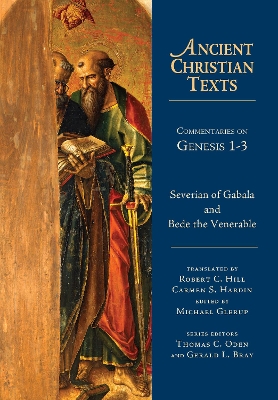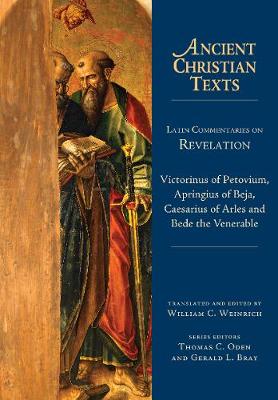Ancient Christian Texts
2 total works
The church fathers displayed considerable interest in the early chapters of Genesis, and often wrote detailed commentaries or preached series of homilies on the Hexameron--the Six Days of Creation--among them Eustathius of Antioch, Basil the Great, Gregory of Nyssa, Theodore of Mopsuestia, Ambrose, John Chrysostom and Augustine.
This volume of Ancient Christian Texts offers a first-time English translation of Severian of Gabala's In cosmogoniam and a fresh translation of a portion of Bede the Venerable's Libri quatuor in principium Genesis. Severian, bishop of Gabala in Syria, who early on was a friend of John Chrysostom, later turned against him and opposed him at the Synod of Oak in 403. Though displaying his own strengths, weaknesses and idiosyncrasies, Severian still represents the so-called Antiochene school with its preference for literal over allegorical interpretation of texts. The text derives from the six homilies found in Migne?s Patrologia graeca, volume 56, together with a seventh homily found only in the 1613 Eton edition of John Chrysostom?s works, edited by Henry Savile, and falsely attributed to Chrysostom. These homilies have been ably translated with explanatory notes by Robert C. Hill.
The commentary from Bede the Venerable derives from Book I of his four-book commentary on Genesis from the account of creation to the casting out of Ishmael. Bede was a polymath--teacher, computist, exegete, historian--and one of the foremost scholars from Anglo-Saxon England. As a teacher, Bede strove to hand on the tradition of the church in a form easily understood by those who might not be well educated. These early chapters in Genesis provided teaching on creation, human origins, sin and redemption. The text deriving from Corpus Christianorum Latina is ably translated with explanatory notes by Carmen Hardin.
Ancient Christian Texts are new English translations of full-length commentaries or sermon series from ancient Christian authors that allow you to study key writings of the early church fathers in a fresh way.
This volume of Ancient Christian Texts offers a first-time English translation of Severian of Gabala's In cosmogoniam and a fresh translation of a portion of Bede the Venerable's Libri quatuor in principium Genesis. Severian, bishop of Gabala in Syria, who early on was a friend of John Chrysostom, later turned against him and opposed him at the Synod of Oak in 403. Though displaying his own strengths, weaknesses and idiosyncrasies, Severian still represents the so-called Antiochene school with its preference for literal over allegorical interpretation of texts. The text derives from the six homilies found in Migne?s Patrologia graeca, volume 56, together with a seventh homily found only in the 1613 Eton edition of John Chrysostom?s works, edited by Henry Savile, and falsely attributed to Chrysostom. These homilies have been ably translated with explanatory notes by Robert C. Hill.
The commentary from Bede the Venerable derives from Book I of his four-book commentary on Genesis from the account of creation to the casting out of Ishmael. Bede was a polymath--teacher, computist, exegete, historian--and one of the foremost scholars from Anglo-Saxon England. As a teacher, Bede strove to hand on the tradition of the church in a form easily understood by those who might not be well educated. These early chapters in Genesis provided teaching on creation, human origins, sin and redemption. The text deriving from Corpus Christianorum Latina is ably translated with explanatory notes by Carmen Hardin.
Ancient Christian Texts are new English translations of full-length commentaries or sermon series from ancient Christian authors that allow you to study key writings of the early church fathers in a fresh way.
Latin Commentaries on Revelation
by Victorinus of Petovium, Apringius of Beja, Caesarius of Arles, and Bede the Venerable
Published 4 November 2011
Interest in the book of Revelation in the Western tradition is stronger and earlier than that in the East. The earliest full commentary on the Apocalypse is that of Victorinus of Petovium written in the mid to late third century by the earliest exegete to write in Latin. Victorinus interpreted Revelation in millennialist terms, a mode of interpretation already evident in works by Irenaeus, as well as in modest allegorical terms.
Caesarius of Arles wrote in the early sixth century and offered a thoroughgoing allegorical-ecclesial interpretation of the Apocalypse. Apringius of Beja in Portugal, writing in the mid sixth century, drew on Jerome's edition of Victorinus's commentary yet understood the seven seals christologically as the incarnation, birth, passion, death, resurrection, glory and kingdom.
Bede the Venerable, who died in 735, is the last commentator to be included in this collection. Characteristically, he passes on commentary from earlier exegetes, here including that of Augustine, Gregory the Great, Victorinus, Tyconius and Primasius.
William Weinrich renders a particular service to readers interested in ancient commentary on the Apocalypse by drawing together these significant Latin commentaries. The work of translating these texts was begun in preparing the volume on Revelation in the Ancient Christian Commentary on Scripture. We are indebted to William Weinrich for completing this work with his able and fresh translation and notes on these texts.
Ancient Christian Texts are new English translations of full-length commentaries or sermon series from ancient Christian authors that allow you to study key writings of the early church fathers in a fresh way.
Caesarius of Arles wrote in the early sixth century and offered a thoroughgoing allegorical-ecclesial interpretation of the Apocalypse. Apringius of Beja in Portugal, writing in the mid sixth century, drew on Jerome's edition of Victorinus's commentary yet understood the seven seals christologically as the incarnation, birth, passion, death, resurrection, glory and kingdom.
Bede the Venerable, who died in 735, is the last commentator to be included in this collection. Characteristically, he passes on commentary from earlier exegetes, here including that of Augustine, Gregory the Great, Victorinus, Tyconius and Primasius.
William Weinrich renders a particular service to readers interested in ancient commentary on the Apocalypse by drawing together these significant Latin commentaries. The work of translating these texts was begun in preparing the volume on Revelation in the Ancient Christian Commentary on Scripture. We are indebted to William Weinrich for completing this work with his able and fresh translation and notes on these texts.
Ancient Christian Texts are new English translations of full-length commentaries or sermon series from ancient Christian authors that allow you to study key writings of the early church fathers in a fresh way.

